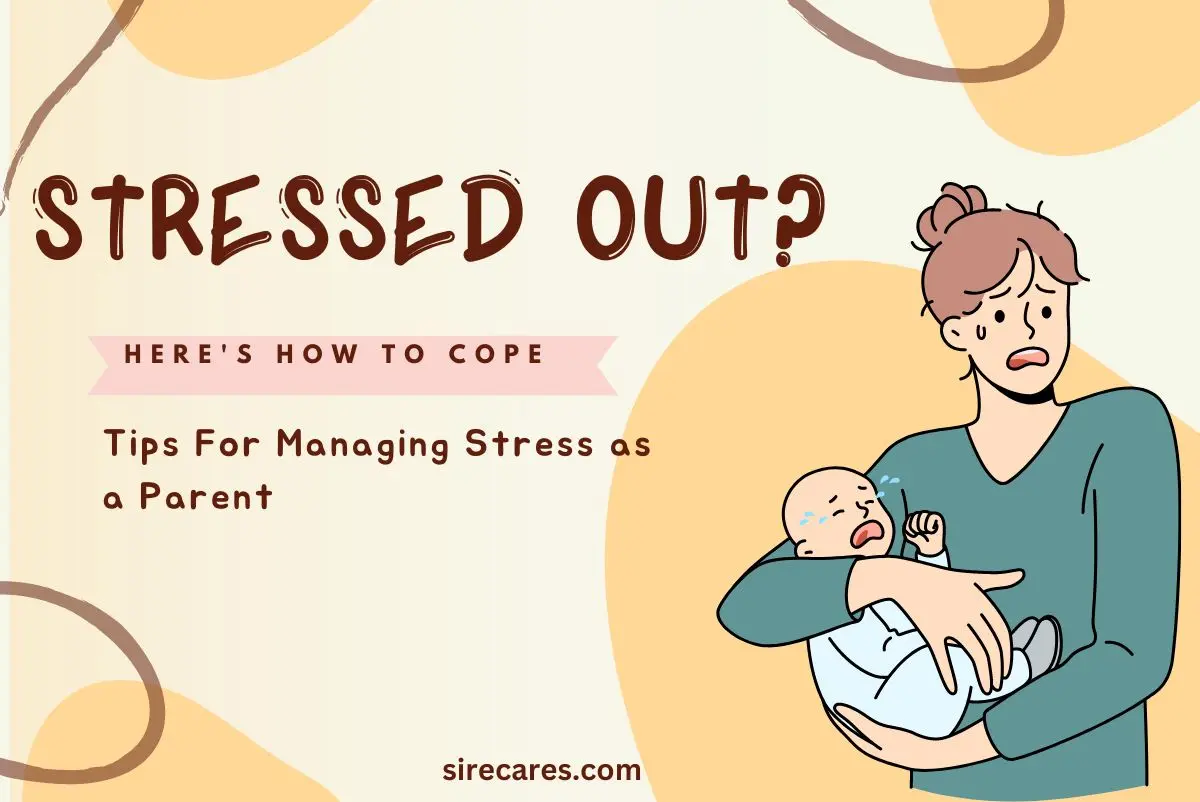Feeling swamped by the tidal wave of parental stress? You’re not alone. Welcome to the ultimate stress-busting guide tailored just for parents like you. In this blog, we’ll reveal the secrets to managing stress and transforming your parenting experience.
6 Tips For Managing Stress as a Parent
Stress is a part of life, but chronic stress can have a detrimental effect on your mental and physical health. As a parent, you may experience stress on a daily basis, but it is important to recognize when stress is becoming overwhelming. Here are some tips to help you manage stress as a parent:

- Prioritize self-care
- Find a support system
- Take breaks when needed
- Practice mindfulness
- Create a routine
- Learn to say no
Let’s dive into these tips in more detail.
Prioritize self-care
It can be challenging to find time for yourself as a parent, but self-care is essential for managing stress. Take some time every day to do something you enjoy, such as reading a book, taking a walk, or practicing yoga. Self-care can help you recharge and feel more equipped to handle the demands of parenting.
Find a support system
Parenting can be isolating, but it doesn’t have to be. Reach out to friends, family, or other parents in your community to create a support system. Having people you can talk to and rely on can make a big difference in how you manage stress.
Take breaks when needed
It’s okay to take a break from parenting when you need it. Whether it’s hiring a babysitter, asking a friend to watch your child for an hour, or just taking a few minutes to yourself, taking a break can help you recharge and come back to parenting with renewed energy.
Practice mindfulness
Mindfulness is a powerful tool for managing stress. It involves focusing on the present moment and letting go of worries about the past or future. You can practice mindfulness through meditation, deep breathing, or simply taking a few minutes to focus on your breath.
Create a routine
Having a routine can help you feel more in control and reduce stress. Create a schedule for yourself and your children, including regular meal times, bedtimes, and play times. Knowing what to expect can help you feel more prepared and less overwhelmed.
Learn to say no
As a parent, you may feel pressure to say yes to everything, but it’s important to set boundaries and prioritize your own needs. Learn to say no to requests that are too much for you to handle, whether it’s volunteering at your child’s school or taking on extra work at your job.
Causes of Parental Stress
Parenting is a rewarding and joyful experience, but it can also be incredibly stressful. Many parents experience stress on a daily basis, and it can have a negative impact on their mental and physical health. There are several causes of parental stress according to sciencedirect, including:

1. Lack of sleep: Sleep deprivation is a common cause of parental stress. When you’re not getting enough sleep, you may feel irritable, anxious, and fatigued, making it harder to handle the demands of parenting.
2. Financial strain: Raising children can be expensive, and financial strain can add to parental stress. Parents may worry about how to provide for their children and meet their needs, leading to feelings of anxiety and stress.
3. Work-life balance: Balancing work and parenting can be challenging, especially for working parents. Juggling work responsibilities with parenting duties can lead to stress and burnout.
4. Relationship issues: Relationship issues, such as marital problems or conflicts with co-parents, can add to parental stress. These issues can create tension and strain, making it harder to parent effectively.
5. Demanding schedules: Many parents have demanding schedules, with little time for themselves or their own interests. This can lead to feelings of burnout and overwhelm.
6. Child-related challenges: Parenting can come with a variety of challenges, including behavior issues, health concerns, and developmental delays. These challenges can add to parental stress and anxiety.
FAQs
How can I find time for self-care as a busy parent?
It can be challenging to find time for self-care, but even a few minutes a day can make a big difference. Try waking up a little earlier or going to bed a little later to carve out some time for yourself.
What if I don’t have a support system?
If you don’t have a support system, consider joining a parenting group or online community. You can also reach out to a therapist or counselor for support.
How do I know when stress is becoming too much?
Pay attention to your body and your emotions. If you’re feeling constantly overwhelmed, irritable, or fatigued, it may be a sign that you’re experiencing too much stress.
Is it okay to ask for help as a parent?
Absolutely! Parenting is hard work, and it’s okay to ask for help when you need it. Whether it’s asking a family member to watch your child for a few hours or reaching out to a professional for support, asking for help can make a big difference.
How can I incorporate mindfulness into my daily routine?
There are many ways to practice mindfulness, including meditation, deep breathing, and yoga. You can also try practicing mindfulness while doing everyday activities, such as washing dishes or folding laundry.
What if I feel guilty for taking breaks from parenting?
It’s common to feel guilty for taking breaks from parenting, but it’s important to remember that self-care is essential for your well-being. Taking care of yourself can actually make you a better parent in the long run.
In A Nutshell
Parenting can be stressful, but there are many ways to manage stress and maintain your well-being. By prioritizing self-care, finding a support system, taking breaks when needed, practicing mindfulness, creating a routine, and learning to say no, you can reduce stress and feel more in control. Remember, it’s okay to ask for help and take care of yourself. By doing so, you can be the best parent you can be.

I am Christiana Williams, a multitasking sociologist and proud mama of three. With a passion for exploring the complexities of modern parenting, I bring my unique perspective and expertise to the table. As a seasoned parent and seasoned sociologist, I have a wealth of knowledge and experience to share. From the ups and downs of raising a family to the latest research on child development, I am on a mission to help other parents navigate the joys and challenges of parenthood. Get ready to be inspired, informed, and entertained as I share my insights and adventures as a parent.




